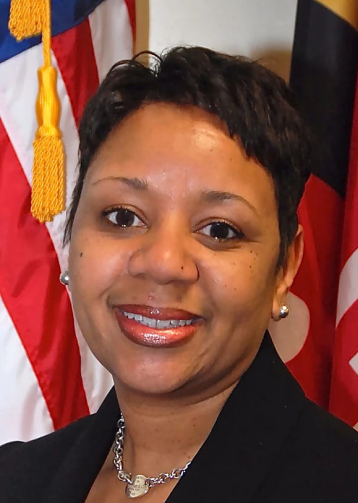
Former DuVal High counselor Troy Sibila, photographed outside the Lanham, Md., school in April. (Ricky Carioti/The Washington Post)
The graduation rate at DuVal High School, in the Washington suburbs, was already impressive when central-office staff paid a visit to talk about a new goal: For the Class of 2017, the target would be 95.4 percent.
Troy Sibila, then a counselor at the school, remembers blinking in disbelief. DuVal’s rate was already well beyond the district average of 81 percent. How could they push even higher?
“Well, at this rate, I can’t wait to make 103 percent,” Sibila recalled joking to those gathered for the meeting.
The flash of humor in fall 2016 foreshadowed serious problems. By the following summer, the public schools of Prince George’s County were mired in allegations that grades had been tampered with, fraudulently inflating graduation rates in one of Maryland’s lowest-performing school systems.
Heralded from local school boards to the White House, graduation rates have become an increasingly popular emblem of school success. President Barack Obama touted the nation’s record rates in 2016, and similar achievements have been cheered in the District, Los Angeles, Chicago and Orlando.
In Prince George’s last year, the school system’s chief executive at the time paraded through high schools with banners and pompoms, in a New Orleans-style dance line, as he extolled long-awaited gains. In four years, the system posted one of the greatest improvements in Maryland, its graduation rate rising more than 8.5 points.
“We have made remarkable progress,” Kevin Maxwell, then the chief executive, proclaimed in early 2017.
But the spirited celebration masked growing concern about whether the rates were real. Before long, state-hired investigators swooped in, and Prince George’s joined other jurisdictions nationally where the thrill of progress was followed by the fog of doubt.
In neighboring Washington, boasts about Ballou High School’s 100 percent college-application rate were followed by a diploma crisis that unraveled an urban school’s success story. Investigators found that 1 of 3 graduates in the District’s public schoolsmissed too many classes or improperly took makeup classes, calling into question hundreds of diplomas last year.
“The pressure was constantly there,” said a DuVal staff member who spoke on the condition of anonymity, citing a fear of retaliation. “Sometimes it was veiled. Sometimes it was not. It was: Find a way to make them pass.”

Former DuVal High counselor Troy Sibila is photographed outside his former school in April. (Ricky Carioti/The Washington Post)
[Some see signs of grade tampering in Maryland school system]
DuVal, in Lanham, Md., is the only school where Prince George’s officials say staff members have faced discipline in the scandal, and many in the county argue it became the scapegoat for a larger crisis. Three counselors were removed from their jobs, an assistant principal resigned, and the principal retired.
Some DuVal staffers who agreed to speak about the school’s experience are being recommended for dismissal.
At issue are grade changes made in the weeks leading up to graduation in 2017 and packets of makeup work that gave students an extra chance to boost a failing quarter grade and pass a course.
The packets are part of what is known as “credit recovery.” It is used across the country but often criticized for lacking rigor. School system officials said DuVal crossed the line, going beyond what the county allowed and creating its own system of packets with looser rules, according to documents.
The DuVal employees tell a different story: They say the school-based packets were commonplace for years — at DuVal and other high schools — and never discouraged. The focus, they said, was on getting students to graduation.
“Our school didn’t do anything intentionally wrong,” said Mark Covington, DuVal’s former principal, who said the packets were there when he arrived in 2014 — and no secret.
“There were no meetings, no conspiracy, no plot to circumvent the rules of the county,” he said. As principal, he regarded them as a permissible form of academic support — another form of makeup work — backed by the school system, he said. “The school system was absolutely aware,” he said.
School system officials declined detailed comment on DuVal and related issues while employees are involved in the “personnel process,” a spokesman said. Amid the scandal, officials repeatedly said that no one from the central office ordered wrongdoing and emphasized that the outside investigation ordered by the state did not find evidence of wrongdoing by Maxwell or his lieutenants.
As the issue has roiled the system, at least two employees are fighting to get their jobs back: Sibila and counselor Yvette Thomasson.
“We did what we were told to do, help at-risk kids,” said Thomasson, who described the scramble to help students in danger of not graduating as “the senior blitz.”
Thomasson said she never would have put her 21-year career on the line by violating rules. She graduated from DuVal in 1990, earned multiple college degrees, used packets at her previous high school and was stunned when she was accused of improperly changing 57 grades, she said. She recently attended a hearing in her case and is hoping for the best.
“We are caught in the middle of something much bigger than we are,” she said.
* * *
Nationally, graduation rates have been climbing since 2011, but questions persist about what that reflects. Are schools and students doing better, or is it simply easier to get through?
Some experts say it’s both.
One concern is credit recovery programs, often done online. Another is scaling back on diploma requirements. Others include not counting struggling students as part of a graduating class, or ignoring extensive absences that could trigger failure.
Schools nationwide have felt the pressure to boost graduation rates, said Michael Petrilli, president of the Thomas B. Fordham Institute, a D.C. think tank.
“Federal law expects states to set sky-high graduation-rate targets and expects schools to hit them,” he said. “As long as that is the case, the cheating and the games will continue.”
Too often, school system leaders pressure educators in the trenches with unreasonable demands, then deny telling anyone to bend the rules, said Julian Vasquez Heilig, a professor of education at California State University at Sacramento. “It’s this blame game, and all the blame is pushed down,” he said.
Heilig said that students today actually do better than in the past but that educators also are more savvy about using and framing data.
At DuVal, graduation rates were among the success stories.
Nearly two-thirds of DuVal’s roughly 1,900 students come from low-income families. Some of its state test scores are low — 8 percent of students showed proficiency last year in Algebra 1 and 23 percent in English 11. But supporters point to its aerospace, culinary and graphics-arts programs, its debate and robotics clubs.
Its graduation rate was ahead of the county average before Maxwell arrived. During the Maxwell era, DuVal’s rate climbed nearly 10 points by 2016.
Maxwell was handpicked in 2013 by County Executive Rushern L. Baker III (D) to turn around a school district with rates that ranked near the bottom in the state. Under Maxwell’s plan, graduation-rate “smart goals” were set for each high school, early warning systems identified students at risk who needed extra support, and credit recovery programs were expanded.
[High school graduation rates fall in Prince George’s but improve statewide]
In February 2017, Maxwell proudly strutted through DuVal’s hallways as part of a high-spirited “bus tour” to eight high schools with graduation rates of 90 percent or better. Educators held up a banner proclaiming DuVal’s 2016 achievement: 92.4 percent. A marching band played.
Some teachers privately rolled their eyes, they said, sure that too much had been done to help students pass.
The next week, reporters converged at DuVal again for a major announcement by Baker: Maxwell would get four more years as chief executive. He was the first leader in more than two decades to get a second contract. Among his achievements: rising graduation rates.
But inside DuVal, the jubilation did not last.
As the 2016-2017 school year progressed, Sibila, in the DuVal counseling office, said he and others tracked seniors as before — reviewing credit counts, eyeing schedules, adding up community service hours. Central-office staffers kept tabs on DuVal’s progress, too.
But in March, Kathleen Brady, the central-level administrator who oversaw DuVal, attended a meeting at the school. According to Sibila and Thomasson, the discussion focused on how few students had participated in a county-run credit-recovery effort. Brady urged the school to use its school-based packets, they alleged.
A schools spokesman said Brady declined to comment about DuVal.
Emails point to a flurry of efforts from March to May. An assistant principal asked teachers for the names of students in danger of failing courses. Sibila wrote that packets were available. A central-office staff member inquired about community service hours, noting that his data showed DuVal heading for an improbable graduation rate of 28 percent.
On May 9, 2017, the assistant principal listed 141 students — in a class of about 330 — who still needed help collecting a diploma. Graduation was just ahead, on May 24.
It fell to Sibila to nudge teachers. He turned on his humor in an email distributed to everyone on DuVal’s staff email list at 10:31 p.m. May 10, using the acronym SOH for “shaking our heads”:
“Below are a list of our seniors who need one last intervention with your assistance. (Yes, we are all SOH). . . . If there is any last-minute, (rub a genie in a bottle),assistance you can [provide to] help our future scholars, please assist, (yes, one more time)!”
* * *
Sibila’s email drew wide attention. It wasn’t just his creative touch. It was the sheer number of students who appeared to be in jeopardy of not getting a diploma so close to graduation day — 42 percent of the Class of 2017.
Some read the message as pressure to alter grades. Sibila, a counselor since 2014, said it was just the usual push. There were always students late to hand in proof of community service, he said. There were always packets not yet completed, other makeup work to be done, tests to retake.
As the email was forwarded, parents voiced alarm, reporters wrote stories and it added to concern already percolating about the accuracy of graduation rates.
[Four school board members in Pr. George’s allege fraud in graduation rates]
DuVal’s rate for 2017 came in among the district’s high-achievers: 91.5 percent.
But by September, a broad investigation of the school system had begun, leading to findings that nearly 5,500 grade changes were made in the days before graduation in 2016 and 2017.
The problem was much larger than DuVal.
Investigators sampled the files of students with late grade changes districtwide and found nearly 30 percent were ineligible to graduate or lacked proof to show they qualified.
Their report also found more than 40 percent of the Class of 2017 had been unlawfully absent more than 10 times, grounds for failing their courses.
And it noted that 16 out of 28 high school programs had “excessive” extra-credit opportunities for failing students or “unofficial” credit recovery efforts, such as DuVal’s.
Graduation rates were not linked to pay raises for school-based employees, but Covington, the former DuVal principal, said the numbers were reflected in his evaluation. He never felt his job was in jeopardy, he said, but added, “The expectation was clear.”
Schools spokesman John White said educators were not unduly pressured to meet graduation-rate goals, but he said that setting goals is “the right thing to do” at a time when students find themselves at a severe disadvantage if they leave high school without a diploma.
“No one was disciplined or fired for not meeting their smart goals, but we certainly did praise people for making gains,” White said.
The district’s focus on DuVal employees came after a hotline complaint in July 2017 led to an internal investigation, done apart from the state-ordered effort. That probe found what appeared to be intentional wrongdoing, according to White.
The school system gave the state a 40-page plan to tighten practices on grading and graduation certification. It has eliminated all packets as part of credit recovery, added more employee training and, according to White, revised goal-setting so that yearly increases are smaller as schools reach higher rates.
[Maryland officials to Prince George’s: Show us you’re fixing diploma scandal]
At DuVal, Bilqiis Sheikh-Issa, 16, a rising senior, launched a petition to bring back DuVal’s “wronged staff members,” starting with Sibila, whom she credits for helping create a sense of community at the school. DuVal was unfairly singled out, she argues, “for the grade changes and the unsanctioned packets that were countywide.”
Sibila was accused of spearheading the unofficial credit recovery effort and making 17 inappropriate grade changes. He said that he was placed on leave without being given details about which student records were at issue and that his access to emails and work files was shut down, affecting his ability to defend himself.
Sibila appealed his recommended dismissal. He said makeup packets preceded his arrival at DuVal and recalled that in 2016-2017, a school central-office administrator told staffers to use them.
“I never thought I was doing anything unethical,” he said. “It was part of our practice, part of our norm.”
Sibila grew up in Prince George’s, graduating from Bowie High, the son of a county teacher and a county police detective. He married a teacher, earned a master’s degree and said that while he likes to see students succeed, he did not glory in higher graduation rates.
Since March, he has gone without pay, his career in peril.
“I did what I was ordered to do,” he said. “No one thought it was a problem. It was coming from the CEO’s team. They wanted us to be just like Howard County or Montgomery County.”
Via Washington Post












 By Lorraine Mirabella, Talia Richman and Liz Bowe
By Lorraine Mirabella, Talia Richman and Liz Bowe



































